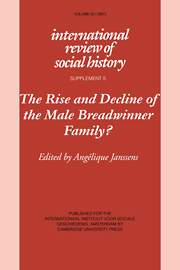 The Rise and Decline of the Male Breadwinner Family?
The Rise and Decline of the Male Breadwinner Family? Book contents
- Frontmatter
- Contents
- NOTES ON CONTRIBUTORS
- 1 The Rise and Decline of the Male Breadwinner Family? An Overview of the Debate
- 2 The Origins and Expansion of the Male Breadwinner Family: The Case of Nineteenth-Century Britain
- 3 Gendered Exclusion: Domesticity and Dependence in Bengal
- 4 Breadwinning Patterns and Family Exogenous Factors: Workers at the Tobacco Factory of Seville during the Industrialization Process, 1887–1945
- 5 Family, Work and Wages: The Stéphanois Region of France, 1840–1914
- 6 Welfare State Attitudes to the Male Breadwinning System: The United States and Sweden in Comparative Perspective
- 7 Comparing the Post-War Germanies: Breadwinner Ideology and Women's Employment in the Divided Nation, 1948–1970
- Notes On Contributors
4 - Breadwinning Patterns and Family Exogenous Factors: Workers at the Tobacco Factory of Seville during the Industrialization Process, 1887–1945
Published online by Cambridge University Press: 04 August 2010
- Frontmatter
- Contents
- NOTES ON CONTRIBUTORS
- 1 The Rise and Decline of the Male Breadwinner Family? An Overview of the Debate
- 2 The Origins and Expansion of the Male Breadwinner Family: The Case of Nineteenth-Century Britain
- 3 Gendered Exclusion: Domesticity and Dependence in Bengal
- 4 Breadwinning Patterns and Family Exogenous Factors: Workers at the Tobacco Factory of Seville during the Industrialization Process, 1887–1945
- 5 Family, Work and Wages: The Stéphanois Region of France, 1840–1914
- 6 Welfare State Attitudes to the Male Breadwinning System: The United States and Sweden in Comparative Perspective
- 7 Comparing the Post-War Germanies: Breadwinner Ideology and Women's Employment in the Divided Nation, 1948–1970
- Notes On Contributors
Summary
“TO BE A HUSBAND OF A CIGARRERA WAS A PROFESSION”
The organization of production by employers was not indifferent to gender. Labour markets were sexually differentiated, since women and men were considered to be distinct labour forces distinguished by virtue of the differing roles they were supposed to play. The male role was that of the breadwinner, and the fact that this often reflected the reality of the situation should not obscure the point that it was a social construction. Women, on the other hand, were considered as mostly occupied with unpaid domestic work, regardless of whether they were also engaged in work for the market. Breadwinning patterns have been widely debated, particularly with respect to whether the male breadwinner system appeared as a result of industrialization or existed previously as a consequence of a universal system of patriarchy. In parallel with a more cyclical conception of industrialization, recent studies on breadwinner patterns do not support theories based on capitalism or patriarchy but rather support a more historical approach based on the importance of other exogenous factors such as the regional economy, the local labour market and the customs and associations acting upon it, employers’ choices or the legal and institutional framework. The following paper is a case study related to working-class women, the cigarreras, who were the main wage earners in the family. It relates to an industry (tobacco) which operated under a monopoly system, and to a particular region (southern Spain), which was fairly underdeveloped in terms of industry.
- Type
- Chapter
- Information
- The Rise and Decline of the Male Breadwinner Family?Studies in Gendered Patterns of Labour Division and Household Organisation, pp. 87 - 128Publisher: Cambridge University PressPrint publication year: 1998
